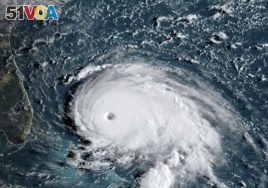10 August 2020
This year's Atlantic hurricane season has already broken records.
But weather experts say it is about to get even worse. In the coming months, the scientists expect to see about two times the usual storm activity.
The United States National Oceanic and Atmospheric Administration changed its seasonal estimates last week. It now predicts 19 to 25 named storms, far more than normal. The agency estimates that seven to 11 of them will become hurricanes, the most powerful ocean storms. The science suggests that three to six of those will become major hurricanes, with winds of at least 178 kilometers an hour.
That is a few more storms than the agency estimated in May. The agency reported an increased chance of an above-average hurricane season from 60 percent to 85 percent.
"It looks like this season could be one of the more active in the historical record," said NOAA lead forecaster Gerry Bell. But, it is unlikely to be beat 2005's 28 named storms. The warmer oceans and other environmental conditions of 15 years ago were more favorable to storm formation, Bell said.
This year's expectation of up to 25 storms is the highest number NOAA has ever predicted. Bell said the agency estimated there would be just 21 storms in 2005.
Colorado State University is a leader in predictive weather science. It also has increased its 2020 forecast. Scientists there now say they expect 24 named storms, 12 hurricanes and 5 major hurricanes.
An average year, based on records from 1981 to 2010, has 12 named storms, six hurricanes and three major hurricanes. Lead Colorado State forecaster Phil Klotzbach said all the signs of a busy hurricane season are in place right now, including increased storminess in Africa. Other signs are warmer waters that fuel storms and reduced high-level winds that kill storms.
"Everything looks ready to be a pretty huge year," said hurricane researcher Brian McNoldy. He is with The University of Miami in Florida.
McNoldy added it is likely that there will be more storms to name than the 21 registered for the season. When additional storms come along, experts use the Greek alphabet to name them.

This satellite image from NOAA/RAMMB, shows Tropical Storm Dorian as it approached the Bahamas and Florida, September 1, 2019.
In a normal year, about 90 percent of storm activity comes after August 6. The height of the season takes place from the middle of August to the middle of October.
The 2020 season has already seen nine named storms.
"Nine storms to this date is crazy," Klotzbach said.
Most of this year's storms so far have been weak, thanks to high-level winds and dry air. But Klotzbach said that is about to change.
Sea surface temperatures in the eastern Atlantic are almost 1 degree Celsius warmer than usual. That provides more fuel for storms. It also leads to changes in air pressure and winds that make for stronger storms, he said.
Studies predict that a warmer world means generally stronger and wetter hurricanes. But NOAA's Gerry Bell said there are too many complexities to an individual season for NOAA to know if climate change is a cause in active years like 2020.
Bell said the biggest climate element is a 25-to-40-year natural cycle of busy and weak hurricanes connected to Atlantic ocean and air patterns. The current active cycle started in 1995, "and we don't know how long it's going to last," Bell said.
I'm Caty Weaver.
The Associated Press reported this story. Caty Weaver adapted it for Learning English. Ashley Thompson was the editor.
____________________________________________
Words In This Story
hurricane – n. an extremely large, powerful, and destructive storm with very strong winds that occurs especially in the western part of the Atlantic Ocean
pattern – n. something that happens in a regular and repeated way
cycle – n. a set of events or actions that happen again and again in the same order : a repeating series of events or actions
crazy – n. wild and uncontrolled
forecaster – n. a person whose job is to predict (something, such as weather) after looking at the information that is available